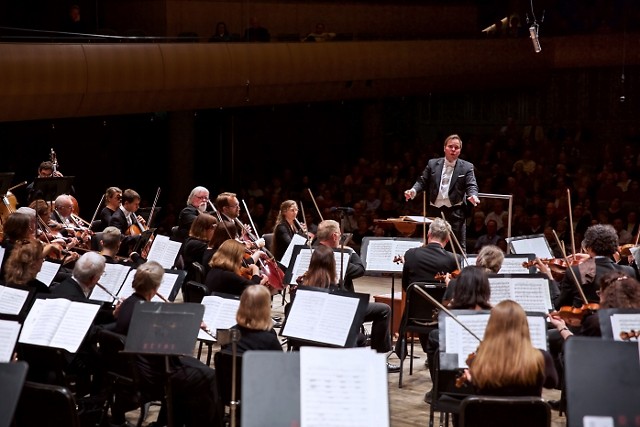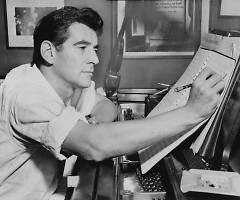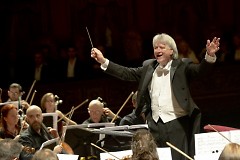Leonard Bernstein, a pianist, conductor, recording artist and larger-than-life personality, almost certainly is the greatest American-born musician the world has yet seen.
He composed musicals such as “West Side Story,” operettas such as “Candide,” and concert music such as his “Age of Anxiety” Symphony No. 2. He introduced millions of Americans to classical music with his “Young People’s Concerts.”
The former music director of the New York Philharmonic led an international orchestra, chorus and soloists in performances of Beethoven’s “Choral” Symphony No. 9 on Christmas Day in 1989, shortly after the fall of the Berlin Wall and the end of the Cold War.
Bernstein, who died in 1990, would have been 100 years old in August.
“Lenny is gone, but he lives on through his music,” said Gwenneth Bean, a West Michigan contralto who enjoyed a close professional relationship with Bernstein in the last decade of his life.
Grand Rapids Symphony celebrates his life and music with an all-Bernstein salute, Bernstein’s 100th, on Friday and Saturday, Nov. 2-3, in DeVos Performance Hall.
Guest conductor Carl St. Clair, music director of the Pacific Symphony Orchestra in California and a former protégé of Bernstein’s, will lead the orchestra in selections from “West Side Story” and “Wonderful Town” with soprano Celena Shafer. Pianist Benjamin Pasternak will be soloist in Bernstein’s “Age of Anxiety” Symphony No. 2.
The concert in the Richard and Helen DeVos Classical series will include the perennially popular Overture to “Candide.” Tickets begin at $18 adults, $5 children. Call (616) 454-9451 or go online to GRSymphony.org.
Though it’s been more than 28 years since Bernstein’s death at age 72, several Grand Rapids Symphony musicians worked with him briefly. Principal oboist Ellen Sherman performed under Bernstein as well as under Marin Alsop, now music director of the Baltimore Symphony Orchestra, in 1988 at the Schleswig-Holstein Music Festival in Germany.
Others worked under Bernstein at Tanglewood Music Center, the summer home of the Boston Symphony Orchestra, in the Berkshire Hills of western Massachusetts.
“We were a bunch of excited puppies eager to obey his every command. Or at least I was,” said violinist Linda Nelson, who played under Bernstein in 1979 at Tanglewood.
Principal cellist Alicia Eppinga called it “life changing to play under a legend like Leonard Bernstein.”
“Not only did he have a complete understanding of the scores that he conducted, but he left no doubt as to the emotional content,” said Eppinga, who played at Tanglewood in 1987 and 1989. “I do vividly recall him stopping conducting altogether and looking at each and every one of us with an expression that conveyed all we needed to know.”
“It seemed to me that Leonard Bernstein lived the life of a classical musician to its absolute fullest, openly showing his love for music and for communicating that passion to others,” Eppinga said.
“He truly was hugely influential to me,” she added with a smile. “And he kissed my cheek!”
Bean, who performed in March 1997 with the Grand Rapids Symphony as soloist in Gustav Mahler’s “Symphony of a Thousand” Symphony No. 8, enjoyed a close relationship with Bernstein for a several years in the 1980s.
“I was so blessed to work with him,” she recalled. “He’ll always be very special to me because he believed in me before I believed in me.”
Trained as a nurse, Bean had joined the chorus of the Lyric Opera of Chicago and had made the jump to solo roles. Her career was just getting stated when she appeared in a performance of Tchaikovsky’s “Eugene Onegin” at the Lyric Opera of Chicago. Bernstein saw the performance, which aired on PBS-TV, and he invited her to come to New York City and audition for him to perform in his Songfest Cycle.
She arrived at Bernstein’s home in the famous Dakota Hotel in time to see Lauren Bacall getting into a limousine, and she chatted briefly with Roberta Flack on the way into the building.
Bean sang for him Erda’s Warning Aria from Richard Wagner’s “Das Rheingold.”
“He said, ‘You have one of the most beautiful voices I’ve ever heard,’” she recalled. “I thought, ‘I’ll bet he says that to everyone.’”
After a series of musical instructions, Bean sang again.
“He got up and said, ‘That was perfect,’” she recalled. “He kissed me and said, 'I don’t know if I like your voice better or your personality.'”
“I almost flew back home without the airplane,” she said with a laugh. “I was so high, and I was so in awe just meeting him.”
By the time she got home, Bean had a message that Bernstein wanted to hire her for a tour of the United States and Europe as one of six vocal soloists in his 1977 cycle of songs for six singers, set to texts by American poets.
The Muskegon native traveled for several weeks on Bernstein’s private jet, staying in hotel suites in London, Paris and Rome.
“It was more money than I had made in the three years before,” she recalled. “But to work with that man, conducting his piece, I still can’t believe I worked with him.”
In 1986, Bean worked with him again for six weeks, appearing in Bernstein’s opera, “Quiet Place,” in Vienna. Between the two, she spent long hours talking with Bernstein about many things.
“One thing about Lenny, he would stay two to three hours to meet everyone who wanted to meet him,” she said. “As much as I loved him, I think he was lonely. He was a needy person.”
Bean spent several years on the roster of the Metropolitan Opera in New York City, and she’s appeared in many of the world’s leading opera houses. But she said nothing tops working with Bernstein.
“Working with Lenny always will be the number one special experience of my career,” she said. “There’s nobody like him.”
The Rapidian, a program of the 501(c)3 nonprofit Community Media Center, relies on the community’s support to help cover the cost of training reporters and publishing content.
We need your help.
If each of our readers and content creators who values this community platform help support its creation and maintenance, The Rapidian can continue to educate and facilitate a conversation around issues for years to come.
Please support The Rapidian and make a contribution today.



